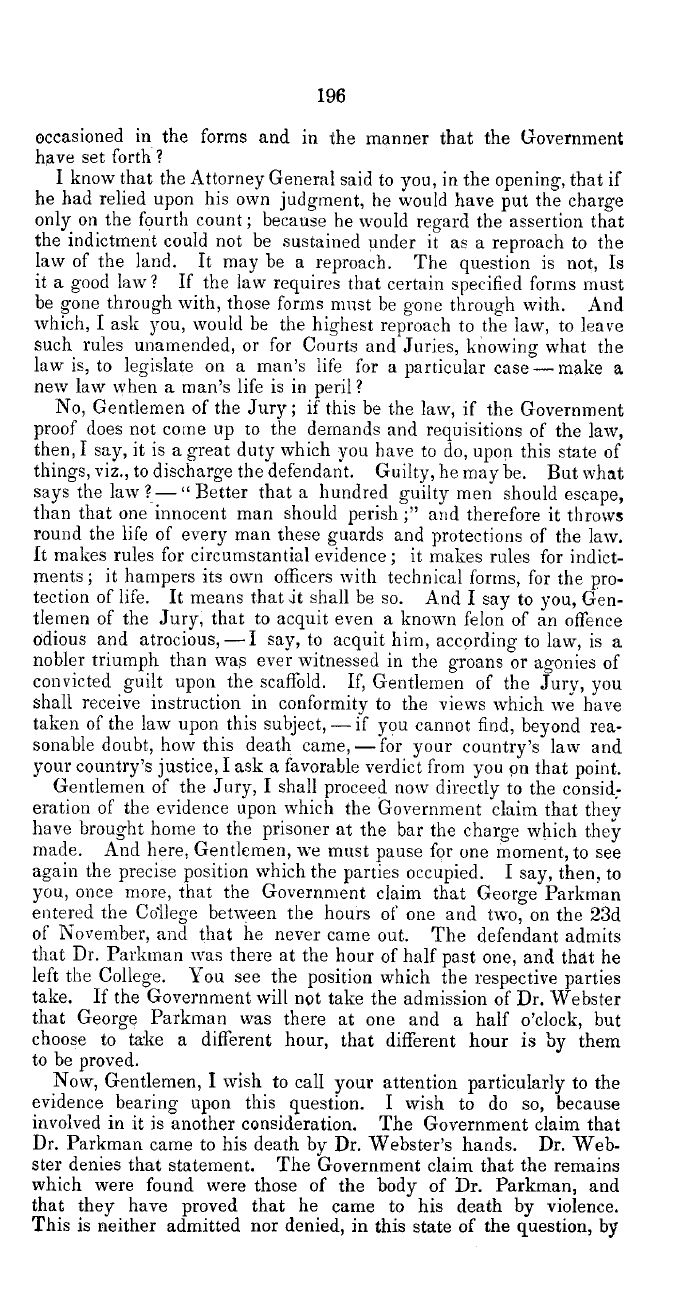|
196
occasioned in the forms and in the manner that the Government
have set forth ?
I know that the Attorney General said to you, in the opening, that if
he had relied upon his own judgment, he would have put the charge
only, on the fourth count ; because he would regard the assertion that
the indictment could not be sustained under it as a reproach to the
law of the land. It may be a reproach. The question is not, Is
it a good law? If the law requires that certain specified forms must
be gone through with, those forms must be gone through with. And
which, I ask you, would be the highest reproach to the law, to leave
such rules unamended, or for Courts and Juries, knowing what the
law is, to legislate on a man's life for a particular case-make a
new law when a man's life is in peril?
No, Gentlemen of the Jury; if this be the law, if the Government
proof does not come up to the demands and requisitions of the law,
then, I say, it is a great duty which you have to do, upon this state of
things, viz., to discharge the defendant. Guilty, be may be. But what
says the law?-°' Better that a hundred guilty men should escape,
than that one innocent man should perish ;" and therefore it throws
round the life of every man these guards and protections of the law.
It makes rules for circumstantial evidence ; it makes rules for indict-
ments; it hampers its own officers with technical forms, for the pro-
tection of life. It means that at shall be so. And I say to you, Gen-
tlemen of the Jury, that to acquit even a known felon of an offence
odious and atrocious, -I say, to acquit him, according to law, is a
nobler triumph than was ever witnessed in the groans or agonies of
convicted guilt upon the scaffold. If, Gentlemen of the Jury', you
shall receive instruction in conformity to the views which we have
taken of the law upon this subject,-if you cannot find, beyond rea-
sonable doubt, how this death came,-for your country's law and
your country's justice, I ask a favorable verdict from you on that point.
Gentlemen of the Jury, I shall proceed now directly to the consid-
eration of the evidence upon which the Government claim that they'
have brought home to the prisoner at the bar the charge which they
made. And here; Gentlemen, we must pause for one moment, to see
again the precise position which the parties occupied. I say, then, to
you, once more, that the Government claim that George Parkman
entered the College between the hours of one and two, on the 23d
of November, and that he never came out. The defendant admits
that Dr. Parkman was there at the hour of half past one, and that he
left the College. You see the position which the respective parties
take. If the Government wilt not take the admission of Dr. Webster
that George Parkman was there at one and a half o'clock, but
choose to take a different hour, that different hour is by them
to be proved.
Now, Gentlemen, I wish to call your attention particularly to the
evidence bearing upon this question. I wish to do so, because
involved in it is another consideration. The Government claim that
Dr. Parkman came to his death by Dr. Webster's hands. Dr. Web-
ster denies that statement. The Government claim that the remains
which were found were those of the body of Dr. Parkman, and
that they have proved that he came to his death by violence.
This is neither admitted nor denied, in this state of the question, by
|

